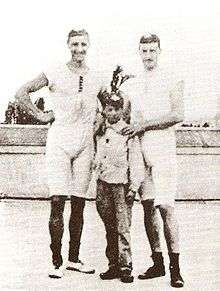Rowing at the 1900 Summer Olympics
| Rowing at the Games of the II Olympiad | |
 | |
| Competitors | 108 from 8 nations |
|---|---|
| Rowing at the 1900 Summer Olympics  | ||
|---|---|---|
| Single sculls | men | |
| Coxed pairs | men | |
| Coxed fours | men | |
| Eights | men | |
At the 1900 Summer Olympics in Paris, four events in rowing were contested, marking the introduction of the sport to the Olympic program. At the inaugural 1896 Games, the rowing competition was cancelled due to strong winds.
Medal summary
Participating nations
A total of 108 rowers from 8 nations competed at the Paris Games:
-
.svg.png) Belgium (11)
Belgium (11) -
 France (47)
France (47) -
 Germany (21)
Germany (21) -
 Great Britain (1)
Great Britain (1) -
.svg.png) Italy (1)
Italy (1) -
 Netherlands (13)
Netherlands (13) -
.svg.png) Spain (5)
Spain (5) -
 United States (9)
United States (9)
Medal table
| Rank | Nation | Gold | Silver | Bronze | Total |
|---|---|---|---|---|---|
| 1 | | 2 | 3 | 1 | 6 |
| 2 | | 1 | 0 | 2 | 3 |
| 3 | | 1 | 0 | 0 | 1 |
| | 1 | 0 | 0 | 1 | |
| 5 | | 0 | 1 | 1 | 2 |
| 6 | | 0 | 1 | 0 | 1 |
| 7 | | 0 | 0 | 1 | 1 |
Coxswain mystery

In the coxed pair event, the names of the coxswains for six of the seven crews entered are not known. Most of these were young French boys weighing about 25 kg, which the French crews employed to their advantage.[5] The winning Dutch crew decided, after losing their heat, that their own coxswain was too heavy, and they recruited a French boy to steer the boat for the finals. The lad, name unknown, is believed to be among the youngest Olympic gold medalists ever (previously estimated as between 7 and 10 years of age).[6] However, the boy was likely 12 to 14 years old.[5]
References
- ↑ Despite information from some sources (DutchNews), the IOC continues to attribute this medal to Mixed Team, as it must be shown in the IOC database (IOC-DB-1, IOC-DB-2).
- ↑ Brockmann was the coxswain for the Dutch team in the semifinal, but not in the final, in which an unknown French boy participated as coxswain. Brockmann is considered a gold medalist by the IOC and is listed in that organization's medal database.
- ↑ Due to wrangling about who would be allowed to compete in the coxed four final, two finals were held for that competition. Both finals are considered Olympic championships by the International Olympic Committee.
- ↑ The German team changed the coxswain after the semi-final. Gustav Moths participated only in the semi-final and Max Ammermann participated in the final. However, the IOC medal database credits the bronze medal only to Gustav Moths.
- 1 2 Bijkerk, Tony (Spring 1997). "ROWING AT THE GAMES OF THE 2ND OLYMPIAD, PARIS 1900". Journal of Olympic History. 5 (1).
I want to state that in my humble opinion this young boy might still be one of the youngest gold-medal winners in the Olympic Games ever, but he is certainly not younger than 12 to 14 years old, as can be deducted from the enclosed photograph. ...nothing can be found about the ages from the coxes from the French rowing teams in Paris 1900. I am quite certain that when the age from these boys could be found, they must have been even younger than the one in the Dutch boat; who had already been discarded because of his weight!
- ↑ Kamper, Erich; Mallon, Bill (1992). The Golden Book of the Olympic Games. Milan: Vallardi & Associati. ISBN 978-88-85202-35-1.
Further reading
- International Olympic Committee medal winners database
- De Wael, Herman. Herman's Full Olympians: "Rowing 1900". Accessed 26 February 2006. Available electronically at .
- Mallon, Bill (1998). The 1900 Olympic Games, Results for All Competitors in All Events, with Commentary. Jefferson, North Carolina: McFarland & Company, Inc., Publishers. ISBN 0-7864-0378-0.